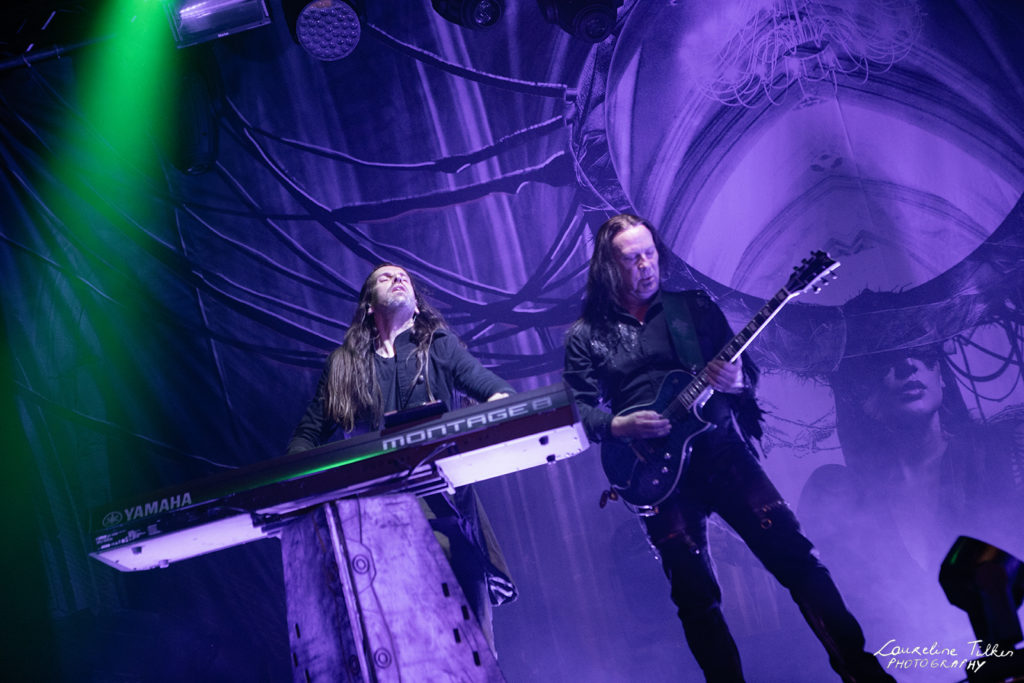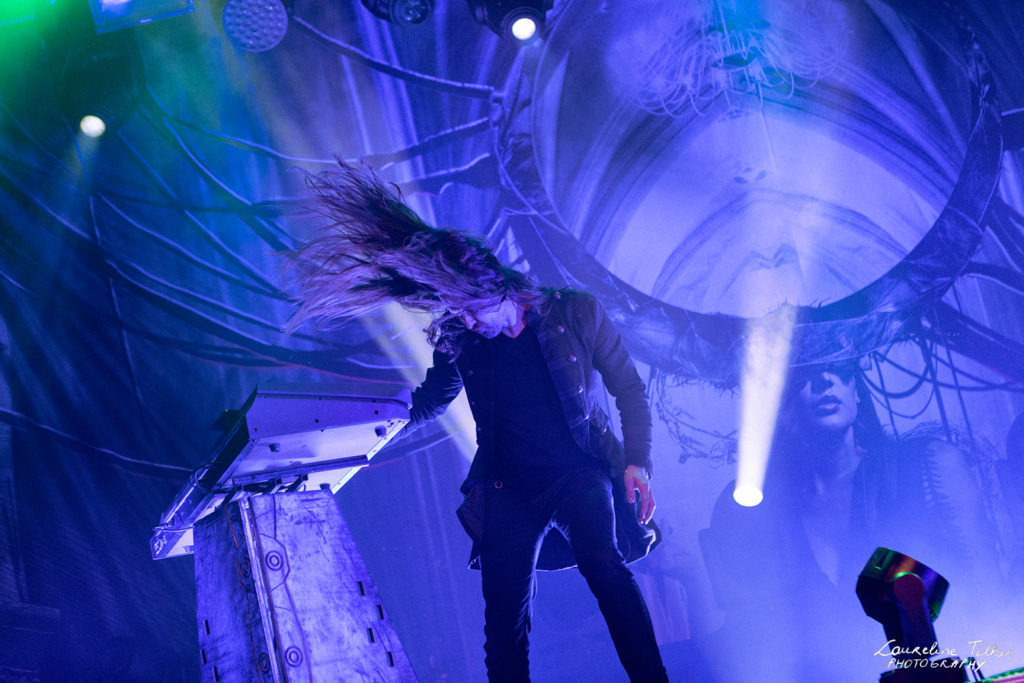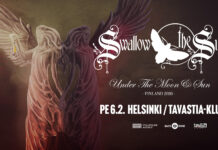Symphonic metal act KAMELOT recently released their new record, “The Awakening.” We chatted with keyboard player Oliver Palotai about the record and the tour before their show in Helsinki. Watch the complete interview here and/or read the complete transcript below…
Thank you so much for taking the time to do this interview. You’re playing at Vanha Ylioppilastalo today; how was your trip to Helsinki?
It’s good. The ferry was awesome, but we had to get up really early, so it was breaking up the day. That’s always tough to handle.
The ferry to Finland is notorious for being a party boat. How was the experience for you this time?
I’ve experienced the strangest things, like people falling down the stairs being so drunk. It’s a very unique thing to do every time. I’ve experienced it many times, but yesterday was okay. I’ve been doing this since 25 years so it’s not a culture shock for me anymore, I’ve been to Finland so many times. At the beginning it was strange, but I’ve experienced it as well in Scandinavia and Finland, so everywhere that people get to be drunk, like super drunk. The first times it was impressive.
On March 17th, you also released your new album, “The Awakening,” which is a little bit after you started the tour. On setlist.fm I noticed you added in an extra song of “The Awakening” since its release date.
We did that the whole first half every day, until we had the feeling there’s the right flow. We even had to learn new songs, which we haven’t prepared, which is – for me as a keyboardist – difficult, because I don’t have an instrument backstage, but that’s a normal thing. Now we’re slowly getting into more peaceful waters, so to say.
I would indeed assume that it’s difficult to change setlists for you. How do you usually prepare for changes like that?
I have to use a few minutes before soundcheck to get to my instrument, listen to the song, and try to figure out what’s happening. Even if I wrote it myself, I usually don’t remember these things.
Does that allow for mistakes during the set sometimes?
Mistakes happen, but I would say we are all on our level now in the band where mistakes are quite rare and I would say you rarely hear it.
How do you handle it on stage when a mistake occurs?
I’m totally calm on stage. That comes with a lot of mental training [done] over the decades. No, I don’t experience any kind of panic, no.
Let’s talk a little bit about the timeframe of this record. Going back to reading about the album, it seems like you have been sitting on it for a while, so when did you first start working on it?
It was pretty much the beginning of the pandemic, the beginning of 2020. We continued writing so, of course, we had more time at home in our studios to work on it. So about when was it? More than 2 years.
Did the pandemic allow you to spend more time perfecting it or was it already done?
Yeah, but on the other hand, I still needed an income, so I had to work on a lot of other things. It’s not that I could sit down for 2 years and work on a KAMELOT record, that would be awesome, but not possible. We always try to add new elements, but on the other hand, we have to stick to the frame which defines ourselves, of course, otherwise it’s not KAMELOT.
Talking about new elements, in a lot of interviews, you mention that “The Awakening” includes a lot of new elements. Can you briefly talk about the new things you introduced in this album?
I would say in my special case, the orchestrations are quite vast, there’s a lot going on, more than in former records. You can also hear that live, the difference with the older songs is pretty big, so that’s definitely something that I did: more complex orchestrations this time.

Is it important for you that listeners can discover new details upon each new listen, given that the orchestrations are so vast?
It would be sad if on the first or the second run, you already know all the details. The weird thing is that if I would show you what is really going on in the keys or the orchestras, there’s so much going on that you basically can’t hear consciously if the rest of the band is there. Let’s say if you have really great headphones, you’re sure you’re going into this fourth dimension and you will detect a lot of cool things there.
Do you have any examples of moments you are particularly proud of on this record?
I mean there are songs like for example “Opus of the Night (Ghost Requiem)” that was quite a challenging song and I could really go wild on classical orchestrations and the other songs like “One More Flag in the Ground,” which is more like a hybrid modern synthesizer sound, and like “My Pantheon (Forevermore)” is a mixture of both orchestra on one side and keyboard sounds all mixed together in different levels. Every song has these little nice special parts, which I’m of course proud of, let’s say I’m happy about.
You mentioned classical orchestrations and I know that you have a degree in music. How much are you actually inspired by classical music in writing these arrangements?
That’s where I’m coming from. I’m a classically trained piano player and jazz pianist. That’s really what I am, I’m not really a keyboardist per se, I’m a pianist, as well as guitarist and a bass player. I’m coming from these genres even more than metal. Metal came later.
So how do you usually get started on writing arrangements, personally?
It depends if I approach the song on guitar or piano, that makes a huge difference. Guitar is very riff-based, so I sit and come up with some cool riffs. On piano, it’s more like I look for harmony structures, for chords, for certain movements, but the point is already since I’m producing music, I take all the instruments already at the very beginning into account, so that let’s say I play a riff, but I already think about what the next layer is, what are the keyboards doing, what is the bass doing, what are the vocals doing, because I’m also then singing on the record, so I’m trying to sketch some of the vocal lines at least of my songs, and I’m not thinking, okay here’s piano and this is… but more like in the context of the whole arrangement.
Are there any songs that you specifically wrote on this record?
I mean everything is basically done by three songwriters, but there are those songs which let’s say the outlines and main sketches were started, in my case it was, “Willow,” “My Pantheon (Forevermore),” “New Babylon,” “Eventide,” I don’t even remember all the songs. I was also flying to Thomas [Youngblood] in the US to write for 2 weeks, where some of the structures were created, like “NightSky,” those things, some were a lot of Tommy [Karevik]’s influence. In the end, we put it all together and then we change stuff and re-arrange.
I read somewhere you had a lot of material written. How do you pick what songs fit on the record and what do you do with leftovers?
Let’s say at a certain point, it was already clear which songs we would really use and we continued working on those. So I have a big folder on my hard drives of unused ideas. I [usually] return to that stuff, sometimes I’m using it, sometimes I’m not.
Well I suppose that there’s going to be a new record then some time a bit sooner than… what was it, 5 years?
It was quite a while, wasn’t it? [laughs]
I don’t know yet what the production for this tour is like, but considering you have the new album and so on, what can you tell people who are still wondering whether they should visit the show about its production?
What’s new is of course our guest singer, which always makes a big difference for us, because she moves differently, she has a different voice, of course. That’s always a new element that also changes the dynamics on stage and Melissa [Bonny] is now a lot actually on stage, she’s on many songs, which is always cool. We have a couple of little gimmicks, stage prop-wise, you will see.
When you decide on the guests on tour, how much do you take the chemistry with the band into account?
It’s people, it’s people-dynamics. Sometimes it’s good, sometimes it doesn’t fit that well, you know, yeah, it’s just like in any other workplace basically, but here we are even on a bus for weeks, which is especially crucial that we somehow get along on our bus.
In some online videos, there’s also a moment where Tommy takes over your keyboard. And sometimes you see that happening with other bands as well. How much trust does there have to be between band mates to do things like that during a show?
I always put in the settings before he enters the stage for this little piano intro he does, that’s important, the tuning, the right sound, or else that could end up really disastrous. He can use whatever he wants to, I don’t mind.
What else does KAMELOT have in store for us in 2023?
The US tour is planned, a couple of festivals, I heard Japan is in the making, that’s what I know so far.
Okay, so I guess people should stay tuned if they want to know more about the next dates! Thanks for your time, do you have any last thoughts you want to share?
I hope we can do this for quite some time to come, we’ll see, it all depends on the fans which are carrying this, and I’m very grateful to everybody who supports us, of course, it’s a really a heartfelt thank you to all the people out there, listening to our music and coming to the shows!

Interview by Laureline Tilkin




